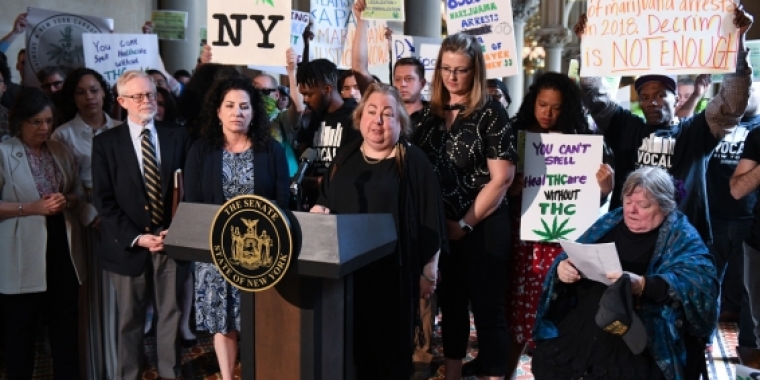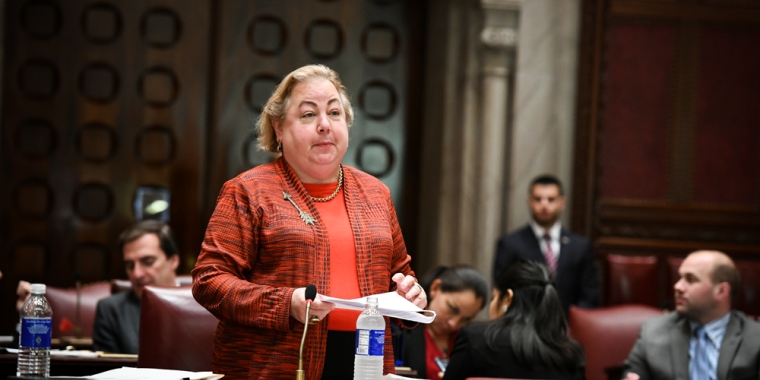
Senator Liz Krueger Praises Senate for Passing Expanded Bottle Bill as Part of the Budget
Liz Krueger
April 1, 2009
Calls it a Win for the Environmental and Business Communities
Albany— An expanded Bottle Bill finally received the New York State Senate’s approval after being bottled up for several years under the Republican controlled State Senate. In the original Bottle Bill, passed in 1982, only carbonated beverages such as soda and beer required a 5 cent deposit. The new bill will expand the original Bottle Bill to include bottled water.
Since 1982 the Bottle Bill has saved taxpayers and municipalities hundreds of millions of dollars in landfill fees and has diverted more than 6 million tons of glass, plastic, and metal from New York's waste stream. The expanded Bottle Bill promises to prevent even more bottles from clogging up New York's landfills and from becoming litter in parks, streets and coastal areas.
"The original Bottle Bill has been the most effective piece of recycling legislation to date," said Senator Krueger. "More than 90 billion bottles have been recycled through it. Unfortunately the bill did not include water bottles which led to them being completely over represented in the waste stream. Now these bottles will finally be recycled at a more equal rate, saving New York valuable landfill space and reducing litter."
The new Bottle Bill will also require 80 percent of unclaimed deposits to go into the Environmental Protection Fund. This will generate an estimated $115 million a year in additional funding. Previously all unclaimed deposits were kept by the beverage industry.
"Closing this loophole that has allowed the beverage industry to collect windfall profits totaling more than a billion dollars since the initial Bottle Bill was passed is a major victory for the environmental community," stated Senator Krueger. "While the bill passed is not exactly the same as the Bigger Better Bottle Bill that Governor David Paterson proposed in his 2009-10 Executive Budget—which would have established a nickel deposit for water and most other non-carbonated beverages, such as sports drinks and iced tea—the expanded version of the law is still a big win for New York."
A review of testimony from a March 4 public hearing held by the Senate Standing Committee on Environmental Conservation on the Bigger Better Bottle Bill found that many of the beverage industry’s complaints about Governor Paterson’s proposal do not apply to the extended version of the Bottle Bill passed by the Senate. Below are some of the complaints voiced at the public hearing in Albany that no longer hold water:
SANITATION
The beverage industry claimed expansion of the Bottle Bill to include non-carbonated drinks would result in unsanitary conditions in retail stores.
Complaint: “A growing number of our stores are selling food, prepared food, pizza, sandwiches and so forth. The last thing you need anywhere near a food prep table is additional mounds of empty, unrinsed bottles and cans.” (James Calvin, president of the New York Association of Convenience Stores)
Fact: Water is not a sanitation problem, especially bottled water. The U.S. Food and Drug Administration’s standards for bottled water are on par with the standards set by the U.S. Environmental Protection Agency for public water systems. Federal law requires water to be packaged in sealed, sanitary containers.
PRICING
The beverage industry claimed enactment of the expanded Bottle Bill would result in a 15-cent increase per container or $3.60 increase per 24-unit case.
Complaint: “In terms of consumers, we’ve estimated expansion of the Bottle Bill to include bottled water could raise the price of a case of water … anywhere from 30 to 50 percent … because of the nickel, because of the handling fee and additional costs that bottlers must take on in terms of complying with the Bottle Bill.” (Daniel Felton, Director of Government Relations for the International Bottle Water Association)
Fact: There already is a huge markup on bottled water prices. Bottled water costs as much as $10 per gallon whereas tap water costs less than one cent per gallon. According to the National Resource Defense Council, 25 percent of bottled water comes from public water sources. For example, in the Albany suburb of Latham, PepsiCo’s Aquafina bottled water comes from municipal supplies. In New York, communities spend $2 billion annually to provide clean and safe public drinking water.
Fact: The expanded Bottle Bill explicitly calls for a nickel deposit for bottled water containers. There is also a 1.5-cent increase to the handling fee bottler or distributors pays to retailers or redemption centers, bringing that fee total to 3.5 cents per each redeemed container. The 8.5-cent combined cost of the redeemable nickel and handling fee falls short of the 15-cent-per-container increase the beverage industry has warned would follow the enactment of an expanded Bottle Bill. Inclusion of bottled water into the Bottle Bill will result in changes to container labeling and inventorying plus the handling and distribution systems, but the Container Recycling Institute doubts the costs from those alterations will equal the 6.5-cent difference between the threatened 15-cent price hike and 8.5-cent law-imposed expenses.
RESALE VALUE
The beverage industry claimed local government would be hurt by the expanded Bottle Bill because it would steer valuable plastic materials away from municipal recycling centers.
Complaint: “[T]his proposal will, in fact, take valuable post-consumer materials out of municipal recycling programs and divert those materials to store-base recycling ... In short, this bill will reduce the average per-ton recovery value of the municipal recycling stream" (Marcus Ferguson, counsel for the Business Council of New York State)
Fact: Recycled cans and bottles are more of a financial burden than an asset for many municipalities, particularly those that participate with private material recycling facilities. It can cost municipalities anywhere from $40 to $75 per ton to get rid of bottles and cans, according to the New York State Association for Reduction, Reuse, Recycling, Inc.
Since the original Bottle Bill took effect in 1982, over 90 billion containers have been recycled in New York State. The law is responsible for reducing beverage container litter by 70 percent and creating about 5,000 jobs to support the recycling program. Under the expanded Bottle Bill, deposit initiators will transfer 80 percent of the unclaimed deposits to the New York State Environmental Protection Fund, which supports various open space, parks, farmland protection, recycling and other environmental programs. Since the law began in 1982, the beverage industry has kept those unclaimed nickels, accumulating over $1.5 billion of them. Maine, Massachusetts, Michigan, California and Hawaii likewise collect unclaimed deposits. Assuming a 68 percent redemption rate, the Container Recycling Institute estimates 2.18 billion containers of bottled water could be recycled annually in New York. The expanded Bottle Bill takes effect June 1.
Share this Article or Press Release
Newsroom
Go to NewsroomSenator Krueger's Community Bulletin - June 2019
June 11, 2019

Senator Krueger's Anti-Scam Newsletter - Spring 2019
June 10, 2019
State Senate Passes Bill To Close Sexting Loophole
June 6, 2019

